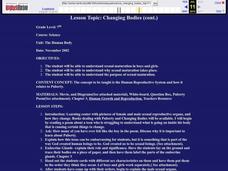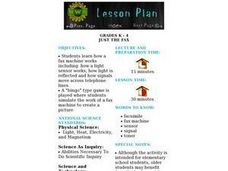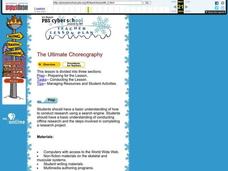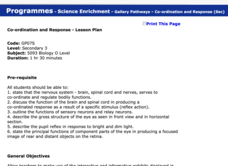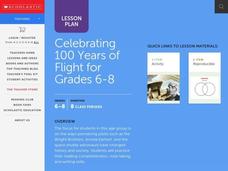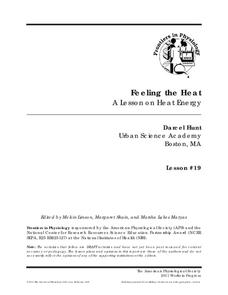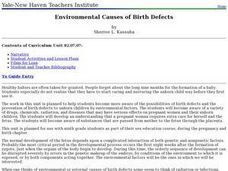Curated OER
Changing Bodies
Seventh graders investigate the human body by viewing a movie and asking questions. In this sexual maturation lesson, 7th graders identify the ways boys and girls develop into men and women through puberty. Students view a video and take...
Curated OER
Interpreting Medical Data
Students explore human anatomy by graphing scientific data. In this vision lesson plan, students discuss how ophthalmology works and take their own eye assessment test using the Snellen chart. Students collect vision data from all of...
A Mighty Girl
Gladys West
Teens might find it hard to imagine life before GPS. Using global positioning systems, they can quickly locate the nearest gas station, fast food establishment, or the home of a new friend. Introduce them to Gladys West, the lady who...
Curated OER
The Buzz on Bees-How Bees Make Our World a Little Sweeter
These lessons can help students learn about the important role bees play in the ecosystem.
Curated OER
The Living Environment
Ninth graders study the work of Alice Huang and complete activities on mutations. In this investigative lesson students complete several activities and discuss their findings at the end.
Curated OER
Just The Fax
Learners discover how a fax machine works including: how a light sensor works, how light is reflected and how signals move across telephone lines. A "bingo" type game is played where students simulate the work of a fax machine to create...
Curated OER
The Human Organism
Eighth graders investigate animal behavior by studying the lives of three female behavior scientists. In this human organism lesson students do different activities that inquire and approach each females work.
Curated OER
The Ultimate Choreography
Eighth graders research the required elements of the short programs in men's and women's figure skating. They analyze the physical requirements of each move and relate the types of muscles, bones, and joints required to perform them.
Curated OER
Co-ordination and Response - Lesson Plan
Eleventh graders explain why colour blindness is more common in men than women.
Curated OER
Celebrating 100 Years of Flight
Participate in the 100th anniversary of the first flight. In groups, learners use the internet to research the roles the Wright Brothers and Amelia Earhart played in promoting the use of flight. They use the information to write and...
American Physiological Society
Hoo Eats Who and What is What in Your Own Backyard?
Bird is the word! Teach life science scholars the importance of our feathered friends and the roles they play in our ecosystem. Using the plan, learners investigate the birds in their areas, determine the biotic and abiotic factors that...
American Physiological Society
Sticky Adaptations A Lesson on Natural Selection
Now you see it, now you don't! The stick bug exhibits the ability to disappear into a wooded environment. Why does this adaptation manifest in some species, but not in others? Life science students explore animal adaptations in nature...
American Physiological Society
Effects of Environment on Enzymes
Much like the tale of Humpty Dumpty, proteins, once altered, will never be the same again. Honors and pre-AP biology classes explore the delicate world of enzymes via a Webquest and lab experiment. The teacher's guide contains all...
Practical Action
Moja Island
Did you know that 1.3 billion people live without any form of electricity? Discover an array of possible renewable energy options by taking a trip to Moja Island, an online learning resource that will equip you and your learners with an...
American Physiological Society
Thermal Insulators: Keep it Hot!
There's nothing like a cup of hot chocolate on a chilly winter's day. Except for when that hot chocolate quickly becomes lukewarm chocolate ... or even cold chocolate. What material provides the best insulation to keep the chocolate from...
American Physiological Society
Did I Observe it or Infer it?
Take the mystery out of inquiry! When young scientists learn to use their keen powers of observation to make smart inferences about a situation, they are well on their way to understanding what the scientific method is all about. Using...
American Physiological Society
It’s the Heart of the Matter
Get the class jumping for joy with a fascinating look at matters of the heart. Learners perform physical tasks, collect and analyze heart rate data, and study conditions that affect heart health. Use the action-packed lesson plan to...
American Physiological Society
Why is Kettle Corn Cooked in Copper Pots?
The kitchen — it's not just for eating anymore! Specific heat is often a difficult concept to grasp, so give it context by relating it to cooking. Learners gain experience in the principles of thermal energy transfer by designing an...
American Physiological Society
Feeling the Heat
How do the changing seasons affect the homes where we live? This question is at the forefront of engineering and design projects. Challenge your physical science class to step into the role of an architect to build a model home capable...
Curated OER
Environmental Causes of Birth Defects
Get your high schoolers thinking about the factors that lead to birth defects. They examine how environmental factors and personal choices can cause birth defects in unborn children. They discover the effects of various handicaps such as...
Cancer Care
What is Breast Cancer?
How gets breast cancer? What are the hereditary risk factors? Can individuals reduce their risk factors? If you are looking for a resource to use during October's in Breast Cancer Awareness Month, check out the lessons in this packet.
Colorado State University
Why Do Hurricanes Go Counterclockwise in the Northern Hemisphere?
Test your class' coordination as they model the Coriolis Effect. Forming a large circle, learners move to the right as they try to toss a ball to the person across from them. The movement of the circle represents the rotation of the...
Curated OER
What's The Story?
Teams of learners integrate reading, writing, math, social studies, and science in this simple, yet effective lesson. They work in groups in order to solve a ten-step problem which requires internet research, the use of a calculator, and...
American Physiological Society
An Inquiry into Alcoholic Fermentation
Introduce life science students to their new "best buds" yeast! Using a wide variety of materials, lab groups design an experiment that illustrates how yeast acquires the resources it needs to undergo cellular respiration. The teacher's...


